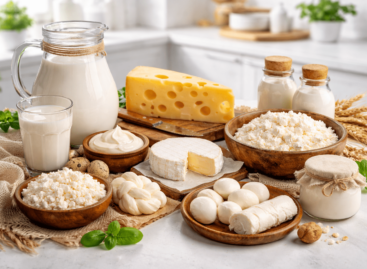MBH: Hungarian agriculture can expect a calmer year than last year
The agriculture and the food industry can expect a calmer year this year than in 2023, mainly the prospects of livestock keepers have improved, a more balanced period in agriculture is expected in the longer term – experts said at MBH Bank’s press conference in Budapest on Tuesday.

According to the managing director of MBH Bank’s agricultural and food industry business, Hungarian agriculture has reached an important period, as it seems that it can move out of stagnation, when the expansion of credit stopped, and survival was the most important goal of a significant number of producers. Dávid Hollósi believes that 2024 could be the beginning of a sustained rise, and that a state of equilibrium can already be reached in 2025. The economic environment is becoming more predictable, fertilizer, feed and energy costs are decreasing, rural development tenders can boost development, so MBH Bank also expects to be able to disburse more and more investment loans as the end of the year approaches, and the stagnation of agricultural lending may come to an end. This year’s rural development tenders may lead to loan agreements next year, a serious revival of agricultural and food industry investments is expected in the second half of 2025, he explained. According to the expert, in the longer term, serious reorganizations are to be expected in arable crop production, and the era when Hungarian exports largely depended on the development of the grain harvest may come to an end. A significant part of foreign markets can be taken over by Russian and Ukrainian grain, Hungarian grain producers must improve their efficiency, they cannot base their operations on state and EU subsidies in the long term. The competitiveness of Hungarian agriculture also depends to a significant extent on the strengthening of food industry companies, the larger players must acquire significant markets at the international level. Their success is also in the interest of small producers, because they can hardly survive if they do not join the big ones – he added. T
he head of MBH Bank’s agricultural and food business branch responsible for agricultural and EU relations also believes in the strengthening of the food industry, as it is the most important consumer of agricultural products
Dávid Mezei emphasized that there is no strong agricultural economy without the development of food industry companies, which is why it is important that almost HUF 1,500 billion is allocated for investments from rural development resources. Applicants benefit from the fact that they can count on an interest subsidy amounting to 10 percent of the total subsidy intensity, the details of which are still being discussed by the banks with the government. Dávid Mezei announced that a new round of development applications may begin in 2025, but it is also possible that the EU agricultural support system will be significantly transformed in the next funding cycle. It is also worth taking advantage of the current subsidies, because it is possible that the changes after 2027 will not favor the producers. The subsidies based on the area and number of animals have covered the costs to an increasingly small extent, and the decline of the EU funds for rural development is not visible only because of the government’s additional funding, he added.
Strategic analyst Csaba Héjja announced that, based on feedback from agricultural loan customers, the assessment of the situation in all product areas had improved by the end of 2023
The outlook is favorable, especially in pig and cattle farming, where stable price and income conditions have developed. Producers of animal products took the other leading places in the ranking, in that order, poultry, egg and milk producers. The prospects for cultivated and field vegetables are somewhat less favorable, due to the significant labor demand, the increase in labor costs in this sector is a serious difficulty, while the assessment of the situation of field crop cultivation is worsened by the permanently low profitability. The fruit growers are the least optimistic, which, in addition to the unpredictable market conditions, can be explained by the fact that domestic plantations are old and out of date, so a structural change in this area is expected in the coming years. According to Csaba Héjja, producers should focus on reducing their costs in the coming years, because this is the only room they have, they have no say in the development of prices. Despite the favorable processes, 2024 will not be an easy year in agriculture either, but the rural development tenders are expected to significantly improve the economic outlook in the coming months, he added.
MTI
Related news
Not a turnaround, but consolidation: an agricultural outlook for 2026
🎧 Hallgasd a cikket: Lejátszás Szünet Folytatás Leállítás Nyelv: Auto…
Read more >Milk and dairy product prices decreased at the beginning of the year in Hungary
🎧 Hallgasd a cikket: Lejátszás Szünet Folytatás Leállítás Nyelv: Auto…
Read more >







